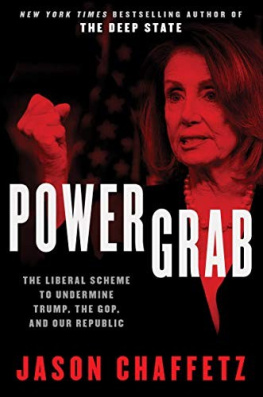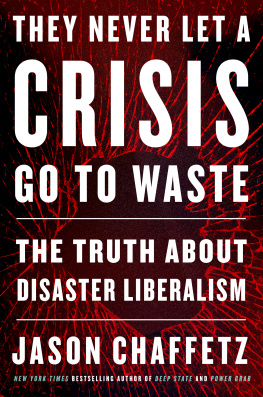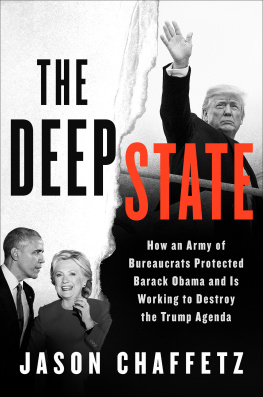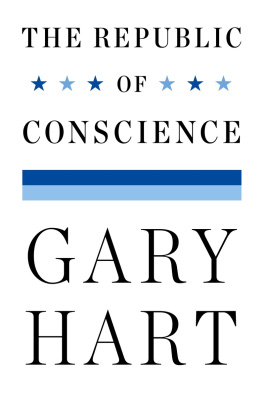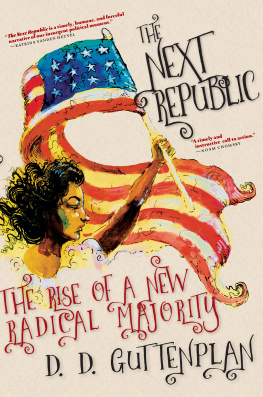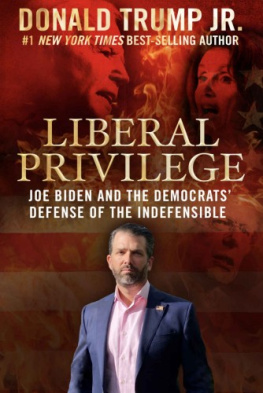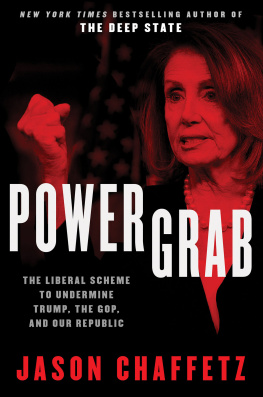Seek first to understand, then to be understood.
Stephen R. Covey
First you win the argument, then you win the votes.
Prime Minister Margaret Thatcher
Dedicated to those who want to be part of the solution, not part of the problem.
I think were a superior branch, quite frankly.
Nancy Pelosi
Contents
The opening line of a call to action on a Daily Kos message board said it all: How is it that Trump is not being investigated for treason? wrote the author, who posted under the name Archprogressive. Just three weeks after Donald Trumps shocking presidential victory over Hillary Clinton, the Russia collusion narrative was already in full swing.
The soon-to-be presidents alleged treasonous crimes had quickly become an article of faith among true leftist believers. In this post, Archprogressive laid out the case: Donald Trump had a computer that communicated only with a Russian bank. The Russian government had hacked at least two election databasesa claim that implied votes had been changed. The allegations suggested Trump had borrowed money from the Russians.
Then came the call to action. The call had already gone viral by this point, having been repeated by countless activists, nonprofits, pundits, and celebrities in the progressive universe. If everyone opposing Trumps takeover of our government calls the local office of their Senators & Congress person as well as President Obama every day, wrote Archprogressive, and demand that Trump be investigated for the treasonous act of colluding with the Russians to influence the presidential election, we might be able to stop Trump from getting into office.
That was a tall order. But progressives pursued it with alacrity.
Without a shred of evidence, many of those theories would be easily debunked. But in the weeks between the election and the inauguration, speculation ran wild. The desperate frenzy to stop Donald Trump from even being sworn in called for congressional intervention. That intervention, so the theory went, would have to come from the committee I chaired.
As a result, many of the calls to action included the number of the House Committee on Oversight and Government Reform as well as those of my D.C. and Utah congressional offices. The calls overwhelmed every office and every voice mail box for many weeks. At one point, someone even posted to Reddit the direct line of the House Oversight Committee staff.
It was in this environment that I decided to host a town hall in my deep Red Utah congressional district. I love doing town hall meetings. They give me an opportunity to explain the backstory that constituents dont always get to hear. I love the dialogue, the differences of opinion, the aha moments when constituents learn something they didnt know before.
Although there have often been wide differences of opinion at these events, they remained productive and respectful. Prior to what would be my last town hall, my biggest such event was an August 2010 event attended by more than one thousand people concerned about the very predictable (and ultimately accurate) projected shortcomings of the so-called Affordable Care Act. Although people on both sides of the issue were angry, we managed to maintain a civil, productive discussion. I think we had a local police officer or two on hand to provide security. But never at any time did I feel I was putting constituents in physical danger by inviting them to a public town hall. That would all change with the progressive backlash to the election of President Donald Trump.
Given the heartburn from so many on the left over the election of President Trump, I opted to schedule the town hall in the most moderate area of my districta city nestled along Salt Lake Countys majestic Wasatch mountains and the last stop before ascending the canyons that contain the Greatest Snow on Earth. Cottonwood Heights, Utah, was more than happy to host. Little did it know this town hall would not be the event any of us were expecting.
When we booked this routine event, we expected heated debate. But we had no way of knowing that national opposition groups would see it as a chance for televised performance theater. Within hours of our announcing the date, unusual things began to happen.
Our offices and the Cottonwood Heights city offices began receiving phone calls from people requesting information about the town hall. But unlike past town halls, many of the callers were irateand many seemed to be reading from the same script. Cottonwood Heights police chief Robbie Russo remembers, The city was barraged with phone calls. Social media that we monitor as a common practice blew up. It was inciting people to attend from outside the city, which is never a good indicator that its going to be a peaceful event.
Indeed, announcements began circulating throughout the metro area, within the state and beyond, in left-leaning Facebook groups, on Twitter, and in mass emails from activist organizations. The event was announced several weeks early, which gave opposition groups lots of time to organize, book flights, and engage a full media blitz.
In our congressional offices, we noticed many of the rude calls we received originated from area codes outside of Utah. The vast majority of callsboth local and long distanceall asked a similar question: Will you be checking ID at the door? It didnt take long to figure out why. The callers wanted to make sure they wouldnt be turned away for not residing in the district. Like most representatives, I did not check IDs and didnt care if people outside of my district wanted to attend my town halls. We welcomed all comers, and I tried to be just as responsive to visitors.
Recognizing that this town hall would likely attract more people than our usual one hundred to two hundred constituents, we quickly moved the venue from the Cottonwood Heights City Hall to the Brighton High School auditorium across the street, where we knew we could seat up to one thousand people. Even that venue would prove to be too small, but for the safety of everyone involved, we were advised not to go any larger.
At that point, we still had no clear picture of the extent of the other sides coordination. But we did catch wind of a few ominous developments.
Not long after the calls began, we were given a screenshot of a Facebook group called Utah Indivisible, in which plans were being finalized for disruptive behavior at our town hall. They even had a training manual (produced by national, nonlocal groups) providing a how-to primer for disrupting and derailing town halls. They called it Indivisible: A Practical Guide for Resisting the Trump Agenda. The plans were very detailed. Fortunately for us, they were also very public.
The Security Challenge
Youre going to get death threats. If you serve in the United States Congress and you do anything at all controversial, someone somewhere will get angry and become unhinged. You have to take it seriously, but unfortunately, threats are not all that unusual. I once had a man leave me a voice mail suggesting he would find me and string me up on a light post. Another tweeted that he would shoot me in the head and yet another would slit my throat. Some threats were hand delivered. Some targeted my wife or my children. Direct threats were unusual but not unexpected.
This was different. We were not dealing with a few isolated cases of mental instability. We needed to be prepared to respond to real constituents with genuine fears and concerns. Against all odds, Donald Trump had just been inaugurated as the forty-fifth president of the United States. Despondent Hillary Clinton voters were still, two months later, trying to process the results of an election for which they had been wholly unprepared. They sincerely believed America had made a terrible mistake.

